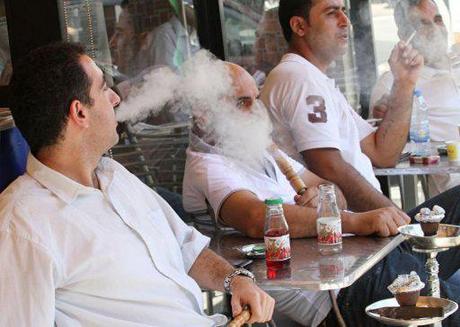
Lebanese men smoking in an outdoor cafe. (Photo: AFP/Anwar Amro)
One of Lebanon’s most successful films last year was Nadine Labaki’s W halla’ la wayn (Where do we go now?). W halla’ la wayn tells the story of a remote Christian and Muslim Lebanese village whose women try to protect their town from the violence that has broken out across the country by preventing their men from learning about it. Throughout the film, the fate of the entire village hinges on the tiniest of details: can the women break the town TV, the radio, hide the weapons? This film beautifully portrays the Lebanese capacity to cope with adversity by ignoring unpleasant realities — but also serves as an allegorical depiction of Lebanon’s fragile status quo.
On a recent trip to Lebanon, I kept finding myself thinking of the village in Labaki’s film while listening to people argue that a new smoking ban would seriously harm the economy – the fate of one resting on a radio, the fate of the other on smoking cigarettes. But unlike W halla’ la wayn, Lebanon’s economy is not a dark comedy set to music, it determines the fortunes of millions of Lebanese. If its prosperity is as fragile as Labaki’s village, then surely the causes of this fragility need to be addressed.
Lebanon’s new ban on smoking in enclosed spaces has met with widespread opposition and even public protests. Although there is some support for the ban, my perception was that even non-smokers thought it was, at best, a waste of government resources. Because around 50% of the population smokes, one might expect opposition strictly for personal reasons, but an argument I heard repeatedly was that the new law would do lasting harm to the economy because people would simply stop going out if they could not smoke. Many people I spoke with believed that the smoking ban would not only lead fewer Lebanese to go out, but would also harm tourism as the reputation of Lebanon’s nightlife suffered and wealthy tourists from the Gulf chose to vacation in more nicotine-friendly destinations.
Anyone who has visited Lebanon knows that Lebanese love to go out, so having to sit on the patio probably will not cause many to stay at home. More importantly, visitors to Lebanon come mostly from other Arab countries, frequently visiting to do things in carefree Lebanon that they may not do in their own countries, so having to smoke outside probably will not bother them either.
Lebanon’s new law may not be an expression of the popular will, but it is probably not going to hurt the economy. Anxiety over the smoking ban stems from the very real damage that the conflict in Syria is doing and may continue to do to the Lebanese economy. Furthermore, much of the outrage over the new law stems from frustration with the government focusing on smoking, rather than addressing the real problems facing Lebanon, such as corruption, instability, and economic downturn. However, the debate surrounding the new non-smoking law provides insight into some key weaknesses of Lebanon’s economic system.
That something as insignificant as limiting smoking causes widespread concern that the economy will falter suggests that Lebanon’s prosperity may be extremely vulnerable. Lebanon’s economy is heavily dependent on tourism and foreign investment, both of which hinge on local and regional stability. To a great extent, the reason these are some of the few thriving sectors is that Lebanon lacks the institutions needed to support both domestic entrepreneurship and more dependable foreign investment. Without mechanisms to ensure government accountability, transparency, corporate governance, and property rights, as well as to protect against corruption, Lebanon’s economic prosperity will always depend on unreliable extrinsic factors to ensure steady streams of revenue. To counter this fragility, it is imperative that Lebanon reduce corruption, strengthen the institutions needed to ensure more steady foreign investment, and foster greater homegrown entrepreneurship. Economic reform surely would do a lot more to encourage investment and stimulate the economy than would allowing smoking in enclosed spaces.
Lebanon’s economic vulnerability underscores the importance of promoting entrepreneurship and reform. CIPE is working with a local partner, the Development for People and Nature Association (DPNA), to support entrepreneurship in Lebanese education curricula to empower youths to contribute to the economy and effectively participate in the democratic process. By integrating the Entrance to Enterprise (E2E) curriculum into the official high school economics course, CIPE and DPNA will help raise interest in entrepreneurship and civic engagement in democracy among Lebanese newly entering the work force.
In addition to promoting entrepreneurship, CIPE is working with the Lebanese Transparency Association (LTA) to combat corruption and facilitate greater private-sector participation in fostering well-governed, democratic political and economic institutions. By empowering citizens to exercise and defend their rights under the law, promoting grassroots organizing and civic participation, and building the capacity of local civil society, CIPE and LTA are working to address key areas in need of reform. The work of these and other civil society organizations has led to substantial progress, but this work must expand if Lebanon is to develop the institutions and citizen engagement necessary to support stability and economic prosperity.
Emerging from civil war, any system that brought Lebanon greater prosperity was a step in the right direction. But the civil war ended two decades ago and Lebanon needs to move toward greater economic stability and government accountability. Such steps forward depend not on outside assistance, but on increased domestic entrepreneurship, economic reform, and more meaningful citizen engagement with the political system. Without such progress, Lebanon’s prosperity will be as fragile as that of the village in Labaki’s film and even minor regional developments may leave Lebanese questioning: W halla’ la wayn?

